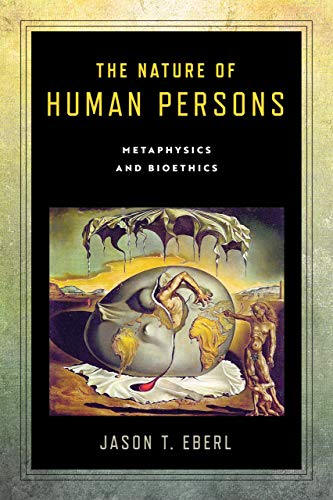Book Review
The Nature Of Human Persons: Metaphysics and Bioethics
by Jason T. Eberl
University of Notre Dame Press June 2020
 This
is a really good work that examines the metaphysical aspects of ethics.
Bioethicists tend to fight shy of discussing metaphysics, because of the
alleged religious connotations of that word. They thus limit themselves to
the field of empirical inquiry. But, as the author argues, metaphysical
presuppositions are already present in bioethical reflections.
This
is a really good work that examines the metaphysical aspects of ethics.
Bioethicists tend to fight shy of discussing metaphysics, because of the
alleged religious connotations of that word. They thus limit themselves to
the field of empirical inquiry. But, as the author argues, metaphysical
presuppositions are already present in bioethical reflections.
For example, what does it mean to be a person? I find it fascinating that Catholic bioethicists turn to biology and conclude that life begins at conception, while an atheist like Peter Singer becomes ever so metaphysical to argue that personhood begins some time after birth. Personhood requires self-reflection, says Singer. From this he concludes that not only the pre-born but infants and those in PVS are not persons.
The author takes a hylomorphic view of personhood. According to Aristotle, every thing has a specific form that defines it as a particular kind of thing. Human beings are persons endowed with capacities for self-reflections, capacities that may not be realized in some cases. In contrast to the hylomorphic view, there is the dualist views of Plato and Descartes. They identify personhood with the mind. The body is thus effectively discarded as an irrelevance. Then there is the physicalist view which identifies human beings with their bodies only, more specifically the brain.
The hylomorphic view also means that it regards the disembodied soul after death as incomplete. Bodily resurrection is required for the human person to fully exist.
A proper interpretation of Thomistic hylomorphism leads Eberl to conclude that a person comes into existence at conception. The idea that a person with potential cannot be considered to have the same ontological status as a fully actualized person is morally flawed.
On the end of life, he argues that the "cessation of both a brain's rationally correlated and biologically integrative functioning indicates that a particular human body is no longer informed by a rational human soul." The whole-brain criterion is sufficient to determine when a human being has died. I am not at all certain of this. It leads him to conclude that a PVS patient "may not be facing imminent death but the provision of artificial nutrition and hydration may nonetheless be futile because it will not improve the prognosis for recovery of conscious rational thought." I disagree.
Leaving aside some reservations, this is a beautifully written metaphysical investigation of what it means to be a person.
